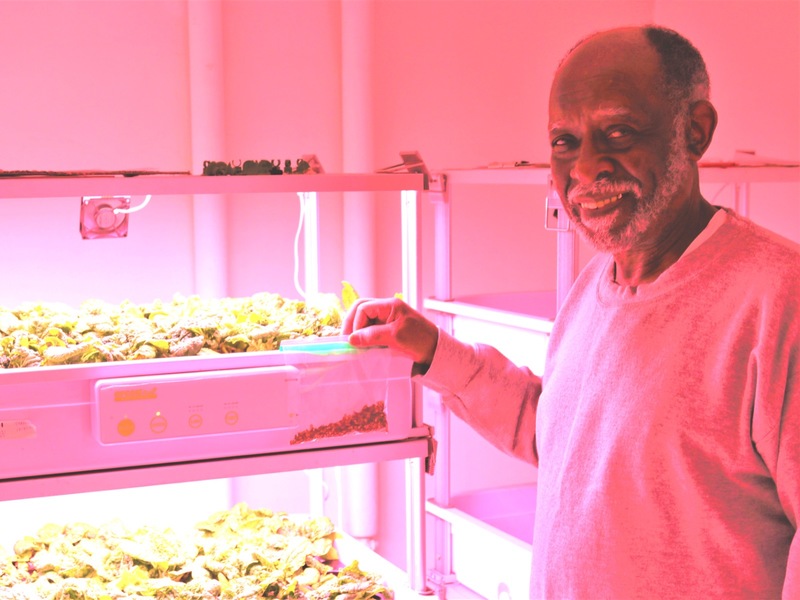The Victory Garden Initiative (VGI) was founded upon permaculture principles by a group of people in a coffee shop three years ago. Its mission is to build communities of people who grow their own food, thus reintegrating human and food ecology.
"The agriculture system now is removed from human culture. The two need to be one, so we're not exporting waste all over the place and importing nutrients," says Gretchen Mead, founding director and VGI's current executive director.
Permaculture, a combination of the words "permanent" and "agriculture," is an ecological design theory promoting the development of self-sustaining systems that attend to three ethics: Earth care, people care and fair share.
Essentially, following these ethics simply involves growing food closer to where people consume it and sharing the excess rather than wasting it. VGI's role within permaculture is promoting and educating people about this culture and helping people grow more of their own food rather than leaving it to professional farmers, who actually participate in a different, less sustainable system.
On Saturday, May 19, Mead, a clinical social worker by training, is receiving the GOLD (graduate of the last decade) Award from UW-Milwaukee's Alumni Association. The awardees are selected because of the contributions they've made to their fields.
Mead says VGI has always been very project-based.
"We started with the premise that we need to get people to grow their own food, which led to the question, 'How can we do this?'" says Mead.
People who came to the first organizational meetings had big ideas and also wanted to get things done. VGI's promotional materials often include the motto, "This is a grassroots movement. Move grass. Grow food."
Everyone was energized and Mead says the group needed to grow, literally and figuratively. VGI currently offers a wide range of programs and is completing its paperwork for non-profit status. It currently has one full-time and two part-time staff members, Mead, Pamela Tuffley and Jazz Glastra.
Glastra has worked at VGI since October 2011. Before that, she was living and working on organic farms in Pennsylvania and Washington. A graduate of Kenyon College with a degree in religious studies and a minor in environmental studies, Glastra helps organize VGI's garden blitz.
The 4th annual blitz week is May 19 to May 26.
"This is a huge project. I'm new to community organizing but my attitude is 'Yes, we are going to do this!'" says Glastra.
VGI's target is 300 new gardens on two big installation days during the week. Volunteers will be busy the rest of the week delivering soil and lumber for the 4-foot-by-8-foot raised beds. On install day, four to five volunteers show up, level the land, build the 12-inch deep garden with the materials waiting for them and quickly move on to the next installation site. Hence, the "blitz."
New urban gardeners can sign up to receive help from a garden mentor. Glastra says VGI has trained about 28 mentors this year.
As part of its mission, VGI also offers educational programs such as the food leader certificate program, which trains organizers to bring people together around the issue of growing food, and the permaculture design certificate.
The design certificate is earned at a week-long course during August, and taught by people who have already been through the program as well as others from around Wisconsin, such as Mark Shepard, who lives on a large permaculture farm in Viola.
VGI also has a community gardens program, in which people rent plots to grow food. VGI has community gardens in Concordia Park in Harambee and at Hide House in Bay View.
Education and outreach programs are organized in fun ways around the community gardens, such as "weed dating," which is when VGI brings in other groups of people to weed the garden plots, "switching beds" after 10 minutes of weeding to meet new groups of people.
The goal of VGI's Fruity Nutty campaign is to plant fruit-bearing trees and shrubs throughout Milwaukee. The trees and shrubs are free to the public. So far, VGI has distributed over 400 hazelnut bushes and over 1,100 blight-resistant chestnut trees.
The Fruity Nutty campaign has mascots, people who dress up like fruits and nuts and travel around interacting with people, much like Klement's racing sausages.
Mead wants to formally challenge the sausages to race the fruity nutty characters.
"The sausages are afraid to race us, because they know we're healthier than them," says Mead.
VGI also has "eat and meets," which are monthly potluck events with speakers.
VGI's message is getting out there. As part of garden blitz week this year, the West Allis Health Department ordered gardens for 24 clients in the WIC program it administers (the federally funded women, infants and children nutrition program).
It's not too late to participate in next week's garden blitz and volunteers are always welcome in the VGI programs. Contact the organization via the website below.
Royal Brevväxling is a writer, educator and visual artist. As a photo essayist, he also likes to tell stories with pictures. In his writing, Royal focuses on the people who make Milwaukee an inviting, interesting and inspiring place to live.
Royal has taught courses in critical pedagogy, writing, rhetoric and cultural studies at several schools in Wisconsin and Minnesota. He is currently Adjunct Associate Professor of Humanities at Milwaukee Institute of Art and Design.
Royal lives in Walker’s Point with his family and uses the light of the Polish Moon to illuminate his way home.







